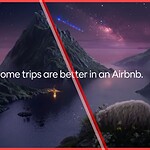Airbnb has launched a new suite of 36- to 43-second ads that do something different: They barely mention homes. Instead, they tell you how to feel. Each short video opens with the line “Don’t just see [city],” followed by three local experiences you can book on Airbnb. The cities featured so far include Lisbon, Venice, Los Angeles, and Paris.
- Don’t just see Lisbon. Experience it with the locals that know it best: In Lisbon, you can surf with a pro, slurp oysters with a marine-turned-chef, or listen to Fado with the son of a music legend.
- Don’t just see Venice. Experience it with the locals that know it best: In Venice, paint canals with a local artist, sip aperitifs with a countess, or try Renaissance printmaking.
- Don’t just see Los Angeles, experience it on Airbnb: In Los Angeles, skate with a pro, go vintage shopping with a rock scene icon, or customize cars with West Coast Customs.
- Don’t just see Paris, experience it on Airbnb: In Paris, roll croissants with the French Bastards, tour Notre Dame with a restoration architect, or dig through flea markets with a vintage guide.
The aesthetic is a noticeable shift from Airbnb’s recent animated campaigns. These ads are visually eclectic: a pastiche of UGC-style clips, warm vintage filters, whimsical text overlays, and sound effects that pop and ping. Each scene focuses tightly on a host, their vibe, and the place they represent. It’s less product demo, more short film. The emphasis is not on the where, but the how.
Alongside these ads, Airbnb has also been releasing a series of Shorts with similar themes, including one about Mexico and another about Tokyo.
New Airbnb Ads Further Airbnb’s Bid to Become a Weekly-Use Travel Platform
This ad campaign is part of a larger rollout. In May 2024, Airbnb relaunched Experiences and introduced Airbnb Services, a new category designed to let guests book additional on-trip offerings like airport transfers, chef-prepared meals, or guided walks.
CEO Brian Chesky has been vocal about Airbnb’s ambitions beyond being a place to find somewhere to stay. The platform wants to be a kind of travel utility: a place guests visit not only to book a place, but to connect with others, discover content, and use it throughout their travel journey. Think Amazon, but for travel. Chesky’s stated goal? To have people use Airbnb every week, not just when they take a trip.
These ads are part of that push. They’re not just marketing Experiences as a category. They’re positioning Airbnb as a platform that sells meaningful time, not just nights.
Experiences as Supply, Social Layer, and Regulatory Hedge
Airbnb’s renewed focus on Experiences isn’t a move that supports multiple goals simultaneously.
1. Expanding the Supply Universe
Airbnb has long relied on homes and rooms as its core inventory. But as regulatory pressure tightens in urban centers, and traditional supply growth slows, Experiences offer a new type of inventory to onboard. They require no physical infrastructure from Airbnb and allow the platform to grow its presence in markets where home listings are shrinking or restricted. In this way, people become the product; hosts, chefs, artists, and guides are the new listings.
2. Building a Real-Life Social Network
Through new features that let guests stay connected with hosts and fellow participants, Airbnb is weaving a more social thread into its user experience. These Experiences are network nodes, sparking relationships that live on within the Airbnb app. It’s a subtle, travel-native version of social networking, one that could evolve into community-based discovery, loyalty loops, or even peer-to-peer recommendations.
3. A Hedge Against STR Regulation
Short-term rentals remain under intense scrutiny, with cities worldwide imposing new restrictions. By leaning into Experiences, Airbnb diversifies its business and regulatory exposure. Unlike home listings, Experiences often face fewer legal barriers, can operate year-round, and can be perceived more positively by local authorities. They support tourism without impacting housing availability, a growing concern in many of Airbnb’s key markets.
Guests Are Spending Less Time, But More Per Day
This shift isn’t unique to Airbnb. It maps onto a broader global trend: shorter trips, higher daily spend, and more curated add-ons.
A June 2025 Forbes article describes this dynamic as a “short-trip summer,” citing a Generali Global Assistance survey that shows American travelers are booking vacations that average just 1.5 weeks, down from two weeks in previous years.
Guests may be spending less time away, but they’re indulging more per day. Janice Wilson, who runs a luxury glamping resort near Washington’s Olympic National Park, noted:
“Most of our guests this season are booking two- to three-night stays. And it seems they make up for brevity with indulgence. They’re downright spendy when purchasing our curated add-ons like our caviar hot dogs or couples massages on their private decks.”
PriceLabs data supports this. In that same article, Richie Khandelwal noted that ADR for July is up 9% year-over-year, with August up 12%. Travelers are spending more for their time, even if that time is shorter.
And this isn’t limited to short-term rentals:
- MasterCard’s 2024 global spending data shows a marked increase in add-on purchases across travel categories, especially wellness, dining, and experiences.
- Royal Caribbean has doubled down on customizable cruise enhancements and luxury bundles.
- Booking.com‘s past guest surveys have shown strong willingness to pay extra for amenities like breakfast, design-forward spaces, and unique host interactions.
Why Add-Ons Make Psychological Sense
There are compelling psychological reasons why travelers are leaning into these indulgences:
- Splurge logic: If I’m spending $X on the trip, what’s $X+50 for something I’ll remember?
- Perceived control: Choosing your enhancements, your host, your experience feels empowering in a time when flight delays and inflation loom large.
- ROI thinking: Travelers want more perceived value from less time. Add-ons boost the return on a short vacation.
In the short-term rental sector, this overlaps with growing guest expectations. A recent Guesty survey highlighted that guests now expect premium amenities like high-speed internet, contactless check-ins, and curated local recommendations as the new baseline.
The Future of Travel Platforms Is All-In-One: Stay, Play, and More
The battle isn’t just for bookings anymore. It’s for share of the experience.
Airbnb’s relaunch is mirrored by other platforms:
- HomeToGo has partnered with GetYourGuide and Komoot to offer curated city tours and outdoor excursions. It’s also acquired two OTAs specializing in bundled wellness city trips.
- Booking.com is doubling down on its Connected Trip strategy, aiming to unify accommodations, transport, and experiences into a seamless journey.
- Vrbo, through its Expedia parent, benefits from bundling capabilities that include flights and car rentals.
In each case, bundling value is the next battleground. Some of it is functional (airport pickup, late checkout). Some of it is experiential (pasta-making, ghost tours). But all of it is designed to increase emotional and monetary stickiness.
What It Means for Short-Term Rental Managers
For professional short-term rental managers, this signals both a challenge and an opportunity. The challenge? Competing in a world where expectations are rising fast and where platforms are actively absorbing more of the guest relationship.
The opportunity? To design for this new reality by offering curated add-ons, partnering with local hosts, upgrading amenities, and articulating your property’s unique value beyond the stay.
Don’t just offer a listing. Offer a world. That’s what Airbnb is selling, and what your next guest might expect.
Uvika Wahi is the Editor at RSU by PriceLabs, where she leads news coverage and analysis for professional short-term rental managers. She writes on Airbnb, Booking.com, Vrbo, regulations, and industry trends, helping managers make informed business decisions. Uvika also presents at global industry events such as SCALE, VITUR, and Direct Booking Success Summit.








